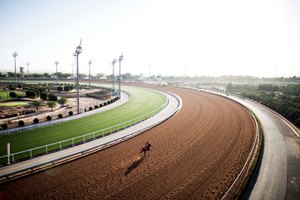Saudi Cup Survives and Thrives Against All Odds


The life-size statue overlooking the Arlington International Race Course paddock shows the dramatic finish of Arlington Million I, with John Henry edging The Bart in the world's first $1 million Thoroughbred race.
The sculpture is titled "Against All Odds" and refers as much to the race itself as to the finish.
But if ever a groundbreaking horse racing event has sprouted and blossomed "against all odds," it would be the Saudi Cup program, to be staged for the second time Feb. 19-20 at King Abdulaziz Racetrack in Riyadh.
This year's version of the $20 million Saudi Cup itself is expecting a roster of equine stars from around the world, including Charlatan, Knicks Go, Max Player, and Sleepy Eyes Todd from the United States.
But consider the obstacles and unknowns facing the Jockey Club of Saudi Arabia in the years of planning that led to the first running of the $20 million race on Leap Day 2020:
- Just for starters, the Kingdom itself and its customs and mores were unfamiliar and, well, a bit foreign to the kingpins of racing from around the world despite the inroads made by Dubai, Qatar, and other jurisdictions.
- There was no precedent for shipping into Saudi Arabia a huge number of horses from around the globe, not to mention stable staff, trainers, and owners.
- Although Saudi Arabia's long history of horse racing was devoid of turf racing, the JCSA scheduled three races on the turf during the first two-day festival.
- Oh … there WAS NO TURF COURSE when the program was announced, and the seeds to grow one went into the ground less than four months before it was set to feel horses' hooves race over it, and,
- The extensive network of support personnel for everything from housing to transportation and communications for participants, media, and spectators was untested and, in some cases, experimental.
As if that weren't enough, along came the first wave of the COVID-19 pandemic. The 2020 races were run Feb. 29, just days ahead of worldwide shutdowns and amid the earliest stages of travel restrictions.
And yet, somehow, against all odds, it worked out. The races were run smoothly and safely, the turf held up nicely and played fairly, and everyone got into and out of the Kingdom with only minimal disruption. As a big bonus, the International Jockeys' Challenge was won by Swiss rider Sibylle Vogt.

"It's hard to overstate the success of Saudi Cup 2020 when you consider that in year one of a brand-new international racing event, we attracted some of the very best horses, trainers, and jockeys in the world," said Prince Bandar bin Khalid Al Faisal, chairman of the Jockey Club of Saudi Arabia, when announcing the 2021 renewal at a virtual news conference in September.
"We witnessed 22 individual group or grade 1 winners, who had accumulated an impressive 34 wins at that level between them. That would be an excellent statistic for even the most well-established race meetings in the world, let alone to have that caliber in year one."

That's not to say there were no snags, of course. A year later, Maximum Security 's owners still haven't received their $10 million winner's share of the Saudi Cup purse as Saudi officials await the result of U.S. legal proceedings against the horse's former trainer, Jason Servis—a process that has no end in sight. The rest of the purse money has been paid.
Jockey Mike Smith also had a rude shock when he was suspended nine days and fined more than $200,000 for excessive use of his whip—allegedly four strikes over the maximum 10—while riding Midnight Bisou to a second-place finish in the big race. He was handed an additional two-day suspension for failing to weigh in after an earlier race. Smith is expected to be back this year to ride Charlatan for trainer Bob Baffert.
"I'll have to teach Mike to count," Baffert quipped during a media conference call—a whip quip.
The event is designed to showcase the Kingdom's aggressive policy to modernize and open itself to foreign travel and sporting competition. Building on the success of year one, the 2021 renewal further extends the Saudi reach into other racing jurisdictions by adding a new event on Friday—the Al Rajhi Bank Saudi International Handicap at 2,100 meters (about 1 5/16 miles) on the turf. The race is open only to Part II and Part III International Federation of Horseracing Authorities jurisdictions (major racing jurisdictions like the U.S., England, Ireland, France, Japan, Hong Kong, etc., are considered Part I countries). The expected field includes locals and runners from Bahrain, Spain, the Czech Republic, and Greece—despite ongoing travel issues due to the pandemic.
The pandemic also will prevent spectators from attending the races this year and the JCSA has outlined extensive precautions to safeguard participants and a limited media contingent.
The Jockey Challenge even gets an upgrade from a gender-quality point of view as Hollie Doyle is due in to participate before riding Roger Charleton-trained Extra Elusive in the Cup.
"Competing in the jockey challenge events is really cool as you get to ride alongside some of the world's top athletes," said Doyle, whose 2020 Royal Ascot breakthrough has led to trips to Bahrain, the U.S., and Hong Kong. "I've only been to some of these places for a short period of time but I've learned a lot. That's what will hopefully make me a better jockey, and I'll keep taking these opportunities with both hands."
That also seems to be the plan for Saudi racing itself—taking opportunities with both hands, even against all odds.
